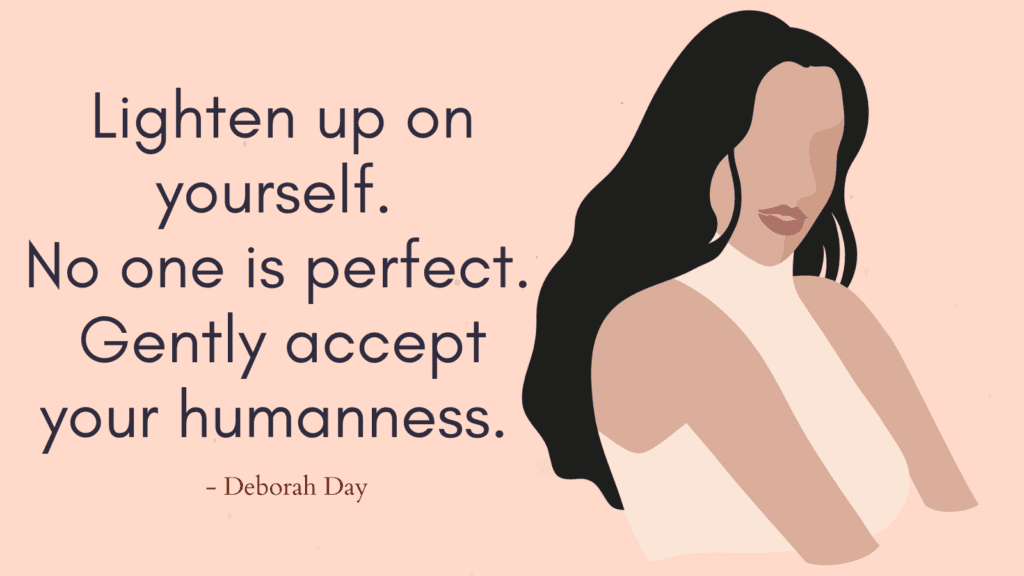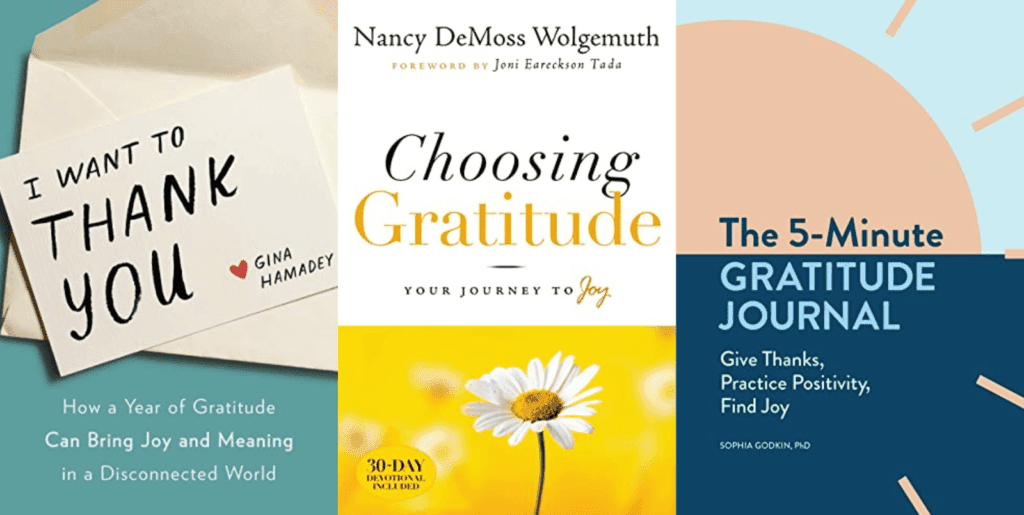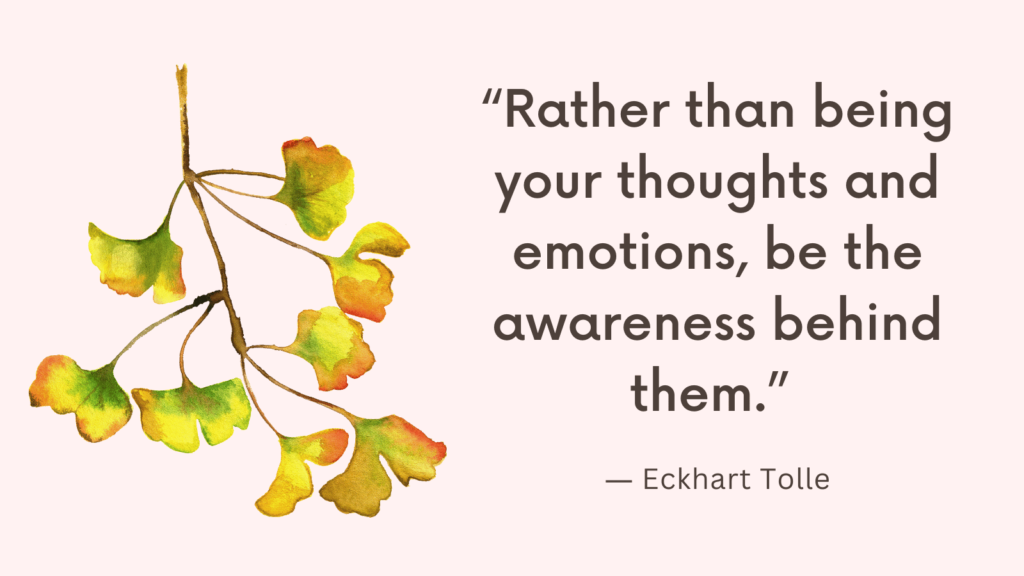Today, you’ll learn how to cultivate an attitude of gratitude using 10 practical gratitude exercises.
Depression can make it difficult to focus on the positive and asking someone who’s depressed to feel grateful can be a tall order.
Appreciation vs. Gratitude
Appreciation is defined as the act of acknowledging the goodness in life—seeing the positives in experiences and people
That’s important,
But gratitude goes a step further.
Gratitude invites us not only to appreciate gifts but also to repay them or pay them forward.
It recognizes that the positive things in life are often due to forces outside of ourselves, mainly the efforts of other people.
Related: What is Concealed Depression? (Effective 3-Step Guide To Overcome High Functioning Depression)
Top 10 Exercises to Cultivate an Attitude of Gratitude
Exercise 1. Say Thank You To Everything You Encounter
The quickest and easiest route to filling your heart and life with gratitude is by saying “thank you” to everything you encounter.
Repeating the word thank you many times a day even if you don’t mean it, will make your subconscious mind believe that you’re indeed thankful and that your life is full of blessings.
It doesn’t matter to whom you’re saying “thank you”. You can say it to someone else, God, or just yourself. It doesn’t matter whether you mean it each time you say it or not.
It will gain meaning as you continue to say it.
Remember that whatever you give, ripples and comes back to you multiplied.
The positive environment you’re creating will open doors to you and will lead you to exciting places.
Related: 50 Little Things That Make Life Happy You Should Be Grateful For
Exercise 2. Keep a Gratitude Journal
There are many ways to cultivate gratefulness, and journaling is one of the best documented.
How To Make The Most Of Your Gratitude Journal?
Every day, list up to five things you are grateful for from the previous twenty-four hours.
The things you list can be relatively large, such as your son graduating, but they can also be small in importance, such as the feeling of the sunlight on your face.
You can briefly describe each item on your list, and write about how it made you feel and what it means to you.
The point is to savor the feelings as you reminisce.
You can write your gratitude list in your own notebook, or on an online platform, such as Thnx4.org, where you can rate each gratitude experience on a scale from “made me momentarily smile” to “made my whole day glorious.”
Related: Best 25 Night Journal Prompts To Help You Sleep Faster
Exercise 3. Show Your Gratitude
Whether it was someone who performed a random act of kindness towards you or someone who has touched your life for the better, always express your gratitude.
Expressing gratitude tends to give a greater burst of happiness than journal writing.
Write a gratitude letter, send gratitude cards, or send a small gift.
Saying “thank you”, isn’t the only way to show your gratitude. Gifts and giving things away are another way to show your gratitude.
If you don’t have money to give, there are many other things you can give:
- The feeling of empathy can touch people and make them feel a lot better.
- Your smile can inspire hope in other people and make them a lot more cheerful.
- A look of compassion can help people feel less lonely.
- A gentle word can lift someone’s mood and boost their confidence.
- Lending a helping hand can ease someone else’s burden.
- A beautiful thought such as wishing someone happiness can go a long way.
- …
Exercise 4. Once in a While, Think About Loss
According to several studies, reflecting on loss makes you more grateful for the life you currently have and the people and things in your life.
Visualizing the loss of someone you love, or something you need, can increase your gratitude measurably, especially when you find yourself taking a good thing for granted.
Exercise 5. Take the Time to Enjoy Your Surroundings
Appreciation and gratitude go hand in hand.
Grateful people never fail to notice the beauty of the small things around them.
Noticing things like the fragrance of the coffee, or the sound of laughter in the playground can boost your mood and increase your gratitude.
One study published in Psychological Science in 2013 found that rituals like prayer can make you pay more attention to food, and enjoy its taste better.
As humans, we are adaptive creatures. We will adapt even to the good things in life, which decreases their value and make us start to take them for granted.
By practicing mindfulness and paying attention to the good things in our lives, be it family, house, or even something like sunlight, we allow them back into our lives.
Related: How To Practice Mindfulness Throughout Your Work Day? (+FREE Resources)

Exercise 6. View the Good Things as a Gift, Not a Birthright
Entitlement is the attitude that people and the world owe you something and therefore you have no reason to feel thankful.
To be grateful here, means that you were created, be it by God, or by your parents, and that you are never truly self-sufficient. As humans, we need other people to meet our physical and emotional needs.
“Seeing with grateful eyes requires that we see the web of interconnection in which we alternate between being givers and receivers,” writes Robert A. Emmons, the world’s leading scientific expert on gratitude “The humble person says that life is a gift to be grateful for, not a right to be claimed.”
Related: How To Live A Peaceful Life? 101 Timeless Principles to Find Peace Within Yourself
Exercise 7. Keep the Focus on Others, Not Yourself
Gratitude researcher Philip Watkins says “Gratitude is an other-focused emotion, where we’re focused on what someone else has done for us.”
When you focus on gratitude as a means to happiness, instead of what gratitude is in and of itself – appreciating what someone else has given or done for us—it’s likely to backfire.
Exercise 8. Be Really Specific
Instead of saying, “I love you because you’re so wonderful!” try saying, “I love you for the dinner you fix me when you see I’m hungry and tired, and the way you hug me when I’m sad.”
This makes the expression of gratitude feel more authentic, showing the other person that you’re genuinely paying attention but also increases your feelings of gratitude.
Exercise 9. Move to Advanced Gratitude
It’s not hard to feel grateful for the good things, but no one ‘feels’ grateful for the boyfriend who dumped them, or the boss who laid them off.
But when gratitude becomes a way of thinking, you can turn disaster into a stepping-stone. Only then will you be able to look closely and find benefits – reasons to feel grateful even to people who have harmed us.
You can thank that boyfriend for being brave enough to end a relationship that wasn’t working or thank the boss who laid us for forcing us to face new challenges.
Exercise 10. Gratitude Meditation
1. Find a quiet space where you will not be interrupted, and sit in a comfortable position.
2. Gently close your eyes and take a slow, deep breath into your belly and feel it expand as you inhale and grow smaller as you exhale.
3. Take a few moments to mentally scan your body for any area of tension, relax that area and release the tension, breathing it out.
4. Notice any fear, anger, jealousy, or judgment and allow them to flow out with each breath out.
5. As thoughts or memories enter your mind, simply allow them to flow out with the breath.
6. Now that your body, emotions, and thoughts are a little clearer, begin to focus on experiences, people, or things in your life for which you feel grateful.
7. Consider the people you know who enrich your life, those who smile at you and cheer you on, and those who support you when you need a shoulder or a hand.
8. When you finish, notice the feeling of your body and breath. Just notice without judging.
Related: Best 8 Mindfulness Exercises For Adults That Will Help You Regulate Your Emotions
Free Printable Gratitude Worksheets (PDF)
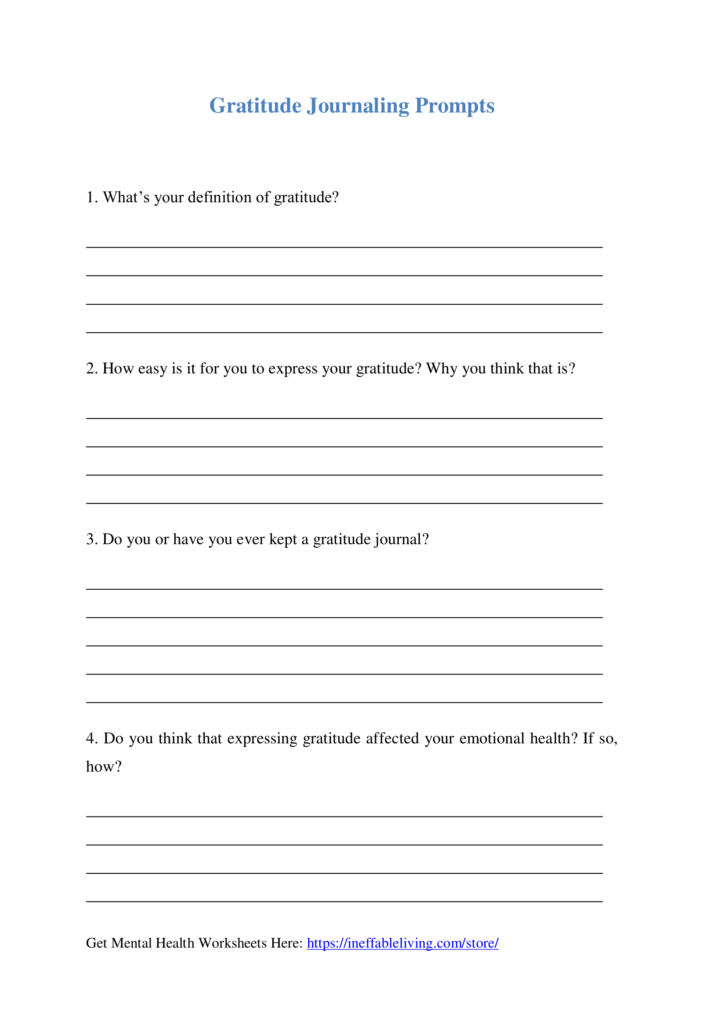
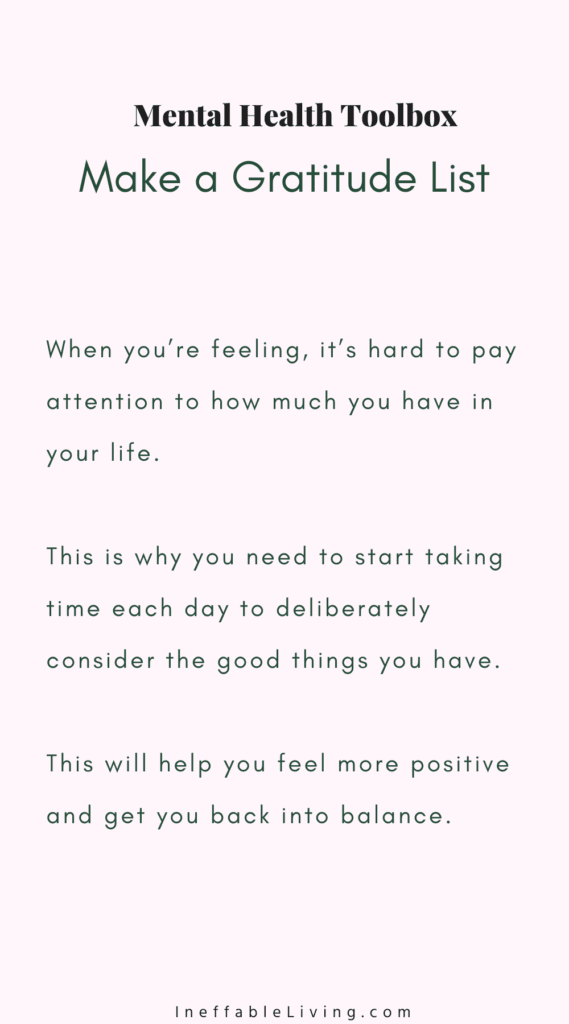
50 Little Things That Make Life Happy You Should Be Grateful For
1. Finding time to sit in a bay window and read.
2. People who love you when you’re born and as long as you live.
3. Having someone by your side when you cry.
4. Having the courage to stay next to someone when they cry.
5. Discovering the freedom that exists beyond despair, when you realize how little everything matters.
6. Being touched by the smallest gestures of friendship.
7. Saying kind things about yourself in your head.
8. Learning something about yourself or about someone else, when you’re hurt by love.
9. Forgiving and being forgiven.
10. Being brave enough to be what you need to be, when you need to be it.
11. Working hard at making yourself who you want to be.
12. Waking up, looking in the mirror, and liking the person who is looking back at you.
13. Not considering caring for yourself indulgent.
14. Being kind and gentle with yourself.
15. Singing to yourself softly sometimes.
16. Always feeling young.
17. Having someone laugh at your jokes, even if it’s you.
18. Taking short breaks between things.
19. Being touched by the softest, gentlest hands.
20. Learning everything you need to learn before what you don’t learn, hurts you.
21. Discovering that love is both a feeling and an action.
22. Drinking enough coffee to get you out of bed but not so much that you can’t find your way back there.
23. Knowing that dreaming a dream is not the same as making something happen.
24. Having the courage to do things for the first time.
25. Not waiting too long to do them.
26. Having the energy and the drive to keep doing things until you succeed.
27. Knowing there’s no overnight success.
28. Learning the difference between the easy thing, the hard thing, the smart thing, and the right thing.
29. Having the strength to make something difficult seem easy.
30. Being proud of every difficult thing you do.
31. Being determined when you need to be, in the little moments of life that make it easy to give up.
32. Being determined when you need to be, in the little moments of life that make it easy to give up.
33. Earning all the trust you’re given.
34. Never having a sleepless night.
35. Never having a doctor looking at you and saying “It’s not good”.
36. Never hating anything longer than you need to.
37. Discovering what it’s like to lose an argument and being okay with it.
38. Forgetting every embarrassing thing that’s ever happened to you.
39. Seeing something everyone’s seen a million times, and you see something different.
40. Learning the difference between someone in a bad mood and a negative influence on your life.
41. Having the courage and strength of spirit to recognize when someone else is right.
42. Constantly searching the world for more but you’re always satisfied with what you have.
43. Learning to balance what you need and what you want.
44. Finding something to do that moves you gracefully through each day.
45. Finding beautiful things in simple things.
46. Being near a window when it rains.
47. Never struggling to find a toothpick when you need one.
48. Not getting angry enough to be stupid or stupid enough to be angry.
49. Your phone ringing and it’s someone you desperately want to hear from.
50. Thinking of something really funny to say, and saying it.
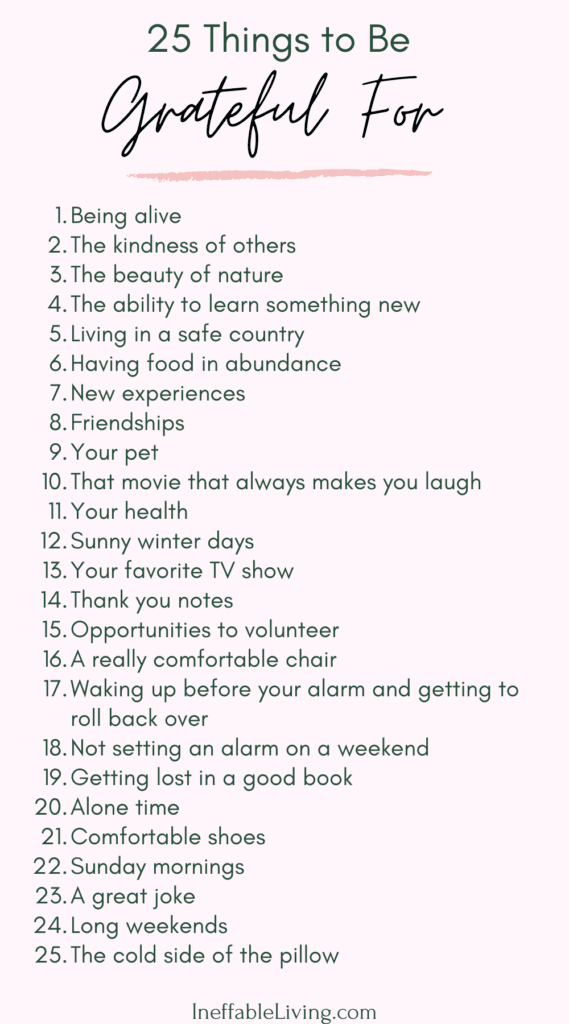
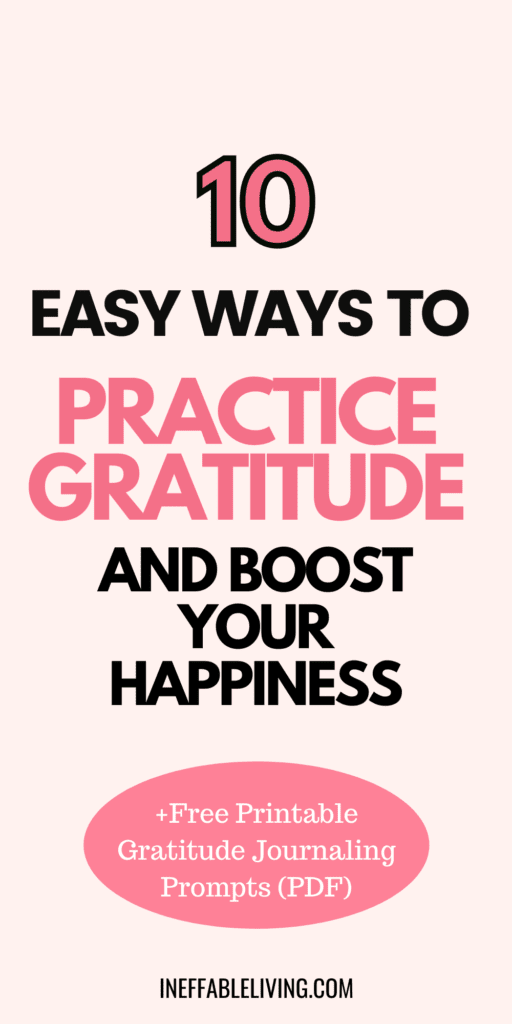
Resources
- Portions of this article were adapted from the book The Gratitude Project, © 2020 by Jeremy Adam Smith, Kira M. Newman, Dacher Keltner, Jason Marsh. All rights reserved.
- How Gratitude Changes You and Your Brain (berkeley.edu)
- Giving thanks can make you happier – Harvard Health
- 28 Benefits of Gratitude & Most Significant Research Findings (positivepsychology.com)
- The Science of Gratitude – Mindful
- Research from USC experts shows link between gratitude and health
- Frontiers | The Reciprocal Relationship Between Gratitude and Life Satisfaction: Evidence From Two Longitudinal Field Studies | Psychology (frontiersin.org)
- Gratitude and Well Being – PMC (nih.gov)
- Research Related to Gratitude – Gratefulness.org
- Science finds that gratitude is good for your health (today.com)
- 7 Scientifically Proven Benefits Of Gratitude That Will Motivate You To Give Thanks Year-Round (forbes.com)
